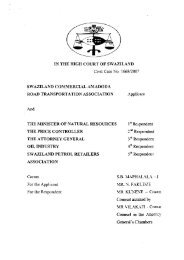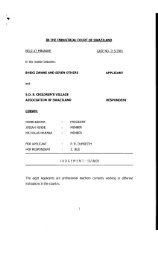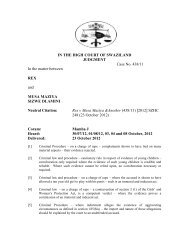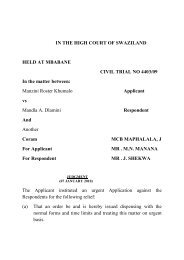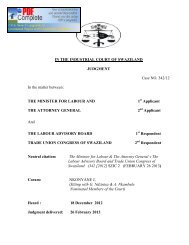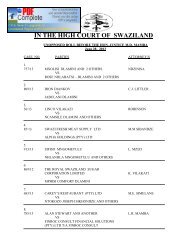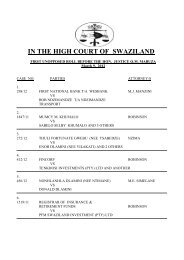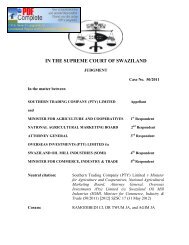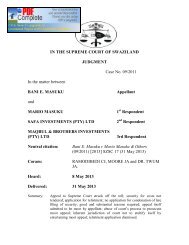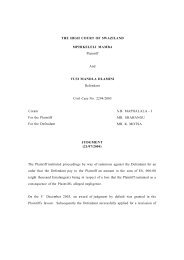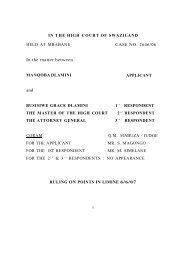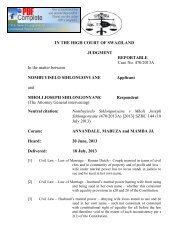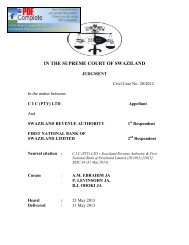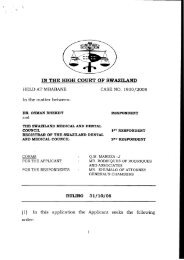ngwenya glass _pty_ ltd vs presiding judge industrial crt ... - SwaziLII
ngwenya glass _pty_ ltd vs presiding judge industrial crt ... - SwaziLII
ngwenya glass _pty_ ltd vs presiding judge industrial crt ... - SwaziLII
You also want an ePaper? Increase the reach of your titles
YUMPU automatically turns print PDFs into web optimized ePapers that Google loves.
IN THE HIGH COURT OF SWAZILANDIn the matter between:JUDGMENTCase No. 3206/2008NGWENYA GLASS (PTY) LTDApplicantAndPRESIDING JUDGE OF THE INDUSTRIALCOURT OF SWAZILAND 1 st RespondentMARIA VILAKATI 2 nd RespondentFIKILE DLAMINI 3 rd RespondentNeutral citation:Ngwenya Glass (Pty) Ltd v Presiding Judge of the IndustrialCourt of Swaziland and Others (3206/2008) [2013] SZHC 48(28 th February 2013)Coram: M. Dlamini J.Heard: 3 rd October 2012Delivered: 28 th February 2013Review application from Industrial Court – when appropriate – wheredismissal is substantively fair but procedurally unfair – outcome thereof –1
award only apportioned to the procedural unfairness – no award onsubstantive fairness made.Summary:The applicant, an employer of 2 nd and 3 rd respondents (hereinafter referredto as respondents) has lodged a review application on the basis that theIndustrial Court failed to apply its mind fully on the matter before it in thathaving found that the respondents had committed a misconduct, it shouldhave consequently concluded that their dismissal was fair and not make anyaward in favour of the respondents.Resume:[1] The applicant is a company duly registered and conducting business atNgwenya. It specializes on <strong>glass</strong> ornaments and artifacts. The 2 nd and 3 rdrespondents have been under applicants employ since 1987 as a grinder and1994 as a waitress respectively. In October 2002, the respondents weresummoned by the applicant together with all the employees of applicant.They were instructed to board two vans. The vans drove to their respectivehomes. In their individual homes, their houses were searched and anumber of products belonging to applicant were retrieved. Due to timeconstraints and owing that it was about knocking off time, not all theemployees’ houses were searched. The employees were taken back toapplicant’s premises. The gate was locked and they were called from theyard into the office of applicant. Applicant caused each employee to signan admission of guilt form before they were allowed exit from applicant’spremises. It is worth noting that there were some who declined to sign theadmission of guilt forms and these were excused. Those whose housescould not be searched were directed to bring back all products stolen fromapplicant the following day when they report for work. They complied.2
16.1 The court failed to properly apply its mind to theimpact of an act of dishonesty such as theft to theemployer-employee relationship.16.2 The honourable court in finding that the dismissal ofthe respondents was unduly harsh unreasonably foundthat the employer/employee relationship between the2 nd and 3 rd respondents and the applicant did notrequire integrity and honesty as an essential requisitefor the performance of their duties and it is submittedthat any employer/employee relationship whereemployees are in a position where they could stealfrom the employer is a employer / employeerelationship based on integrity and trust. Furtherintegrity and trust is an implied and important term ofany employer / employee relationship and the absenceof trust renders the employer / employee relationshipintolerable.16.3 The honourable court also unreasonably found that the2 nd and 3 rd respondents showed remorse and conditionand this finding was not borne out by the facts in thatwhilst yet 2 nd and 3 rd respondents had admitted thetheft in writing, in the application before the IndustrialCourt and in their evidence before that Court, the 2 ndand 3 rd respondents steadfastly denied the theft andgave dishonest exculpatory evidence which the 1 strespondent dismissed.4
16.4 In any event even in the event the and 3 rd respondentshad shown contrition, which is denied, the fact that anemployer who has discovered employees dishonesty,upon discovering the dishonesty is faced with apologyand contrition does not necessarily repair the damagedone to the employer/employee relationship renderingit intolerable.16.5 The court found unreasonably in the circumstances inthat where the court finds that an employee has beendismissed for a proven act of dishonesty or otherserious misconduct, the court should not lightlyinterfere with the employer’s decision simply becauseit, [the court] may have come to a different decisionbut should apply the “Manager margin”.16.6 The finding of unfair dismissal in the circumstancesand coupled with an award of notice pay andcompensation amounts, with all due respect, toawarding the 2 nd and 3 rd respondents for theirdishonesty by way of theft and for their denial of thetheft before the honourable court and does not accordwith any reasonable persons idea of reasonableness orjustice and nor does the award accord with the objectsof the Industrial Relations Act and / or theEmployment Act.5
17. The honourable court a quo followed its own judgment in thecase of Dalcrue Holdings v Alpheus Dlamini, IndustrialCourtCase No. 382/2004, which judgment was at odds ormisinterpreted with the judgment of the Industrial Court ofAppeal in the case between S. U. B. v Amstrong Dlamini inthat the 1 st respondent, with respect, wrongly comes to theconclusion that the law of Swaziland is that the dismissalwhich is not preceded by a fair disciplinary hearing will onlybe fair in certain exceptional and demarcated circumstanceswhereas the laws of Swaziland as enunciated in the S.U.B. <strong>vs</strong>Amstrong Dlamini case is that there may be some instanceswhere the failure to hold the disciplinary hearing in and ofitself will result in an unfair dismissal.18. The honourable court a quo due to its flawedapplication of the S.U.B. <strong>vs</strong> Amstrong Dlaminiresulted in the honourable court first finding that:18.1 The dismissal was unfair because there was nodisciplinary hearing; and18.2 Thereafter entering into enquiry whether theemployer had any justifiable reasons for notholding a disciplinary hearing when the testought to have been;18.2.1 was the failure to hold a disciplinaryhearing in the circumstances unfairgiven the consequences of the failure to6
hold such a hearing such that it renderedthe entire dismissal unfair.19. Even in the event the honourable court correctly foundthat the dismissal was unfair for not according theemployees a hearing, which is denied, the honourablecourt was unreasonable in awarding anything at all toformer employees who had been found to havecommitted an act of dishonesty by stealing from theiremployer and acted unreasonable in awarding noticeto such employees when the nature of their misconductjustify summary dismissal as contemplated by theEmployment Act.20. The honourable court was further unreasonable inawarding costs in favour of the 1 st and 2 nd respondentsnotwithstanding their proven dishonesty towards theiremployer, the false version of evidence given in theopen court with regard to their dishonesty and theirlack of remorse displayed in court.21. The Industrial Court does not award costs as a matterof course and just normally find some reason justifyingan award of costs.22. The honourable court has not justified nor stated why,when costs do not normally follow the event in theIndustrial Court, costs were awarded against theapplicant.”7
[5] Respondent has in au contraire raised a point in limine as follows:“3. (a) Applicant’s main gravamen is this that the trial <strong>judge</strong>sunderstanding of the case law on procedural fairnessin labour relations is “flawed” or the <strong>judge</strong>“misinterpreted” the law. This is alleged misdirectionon a point of law which is appealable and notreviewable.b) Applicant alleges mere unreasonableness of thejudicial decision without any allegation of mala fidesor ulterior motive, nor procedural impropriety. Thiscourt is thus being invited to interfere with the decisionof the trial court if this court would not have arrived atthe same decision.”[6] In the light of the point in limine raised by respondent, it is imperative that Iaddress it at this stage.[7] Section 19 (5) of the Industrial Court Act 2000 as amended reads:“a decision or order of the court or arbitrator shall at the request ofany interested party, be subject to review by the High Court ongrounds permissible at common law”[8] Discussing the term “review” Innes C. J. in Johannesburg ConsolidatedInvestment Co. v Johannesburg Town Council 1903 TS 111 at 114-116stated:8
“If we examine the scope of this word as it occurs in our Statutesand has been interpreted by our practice, it will be found that thesame expression is capable of three distinct and separate meanings.In its first and most usual signification it denotes the process bywhich, apart from appeal, the proceedings of inferior Courts ofJustice, both Civil and Criminal, are brought before this Court inrespect of grave irregularities or illegalities occurring during thecourse of such proceedings…But there is a second species of review analogous to the one withwhich I have dealt, but differing from it in certain well-definedrespects. Whenever a public body has a duty imposed upon it bystatute, and disregards important provisions of the statute, or isguilty of gross irregularity or clear illegality in the performance ofthe duty, this court may be asked to review the proceedingscomplained of and set aside or correct them…..Then as to the third signification of the word. The Legislature hasfrom time to time conferred upon this Court or a Judge a power ofreview which in my opinion was meant to be far wider than thepowers which it possesses under either of the review procedures towhich I have alluded.”[9] Booysen J. in Anchor Publishing Co. (Pty) v Publications Appeal Board1987 (4) S.A. 708 at 728 D – F defining the distinction between an appealand a review pointed out as follows:9
“It is important, when considering a matter such as this, to bear inmind the main distinction between an appeal and a review and thatis that the court will on appeal set aside a decision when it issatisfied that it was wrong on the facts or the law, whilst judicialreview is in essence concerned not with the decision but with thedecision-making process. ….. upon review, the court is thus ingeneral terms concerned with the legality of the decision and not itsmerits.”[10] Applying the above dictum, their Lordships in Liberty Life Associationof Africa v Kachelhoffer 2001 (3) S.A. 1094 C at 1110-111:“Review and appeal are dissimilar proceedings. The formerconcerns the regularity and validity of the proceedings, whereas thelatter concerns the correctness – or otherwise of the decision that isbeing assailed on appeal.”[11] In summary, in review proceedings, it is not for the <strong>presiding</strong> officer topronounce on the correctness or otherwise of the decision of the court aquo, tribunal or body as the case may be, but to ascertain whether thedecision has been arrived at judiciously. Sapire C. J. in The University ofSwaziland v The President of the Industrial Court & Another, CaseNo. 3060/2001 stated simpliciter:“It is not for this court on review to consider the correctness of hisdecision on whether he properly came to that conclusion on the factsbefore him.”10
[12] With this notion at its backdrops the legislature enacted under section 19(5) of the Industrial Relations Act 2000 as amended:“a decision or order of the court or arbitration shall, at therequest of any interested party, be subject to review by theHigh court on grounds permissible at common law.”[13] Common law grounds for review were well articulated by his LordshipTerbutt J.A in our locus –classicus, Takhona Dlamini V President ofthe Industrial Court and Another case no 23/1997 at page 11 as follows;“…the jurisdiction of the High Court to review decision of theIndustrial Court on common law grounds. Those grounds embraceinter alia the fact that the decision in question was arrived atarbitrarily or capriciously or mala fide or as a result ofunwarranted adherence to a fixed principle or in order to further anulterior or improper purpose or that the court misconceived itsfunction or took into account irrelevant consideration or ignoredrelevant ones, or that the decision was so grossly unreasonable as towarrant the inference that the court had failed to apply its mind tothe matter. (See Johannesburg Stock Exchange and Another VWitwatersrand Nigel Ltd and Another 1988 (3) SA 132 (AD) at 152A-E). Those grounds are, however not exhaustive. It may also bethat an error of law may give rise to a good ground for review.”[14] Ota J. A. in James Ncongwane v Swaziland Water ServicesCorporation (52/2012) [2013] SZSC 65 expounding on the common lawground for review tabulated as follows:11
“It is overwhelmingly evident from the aforegoing, that the commonlaw grounds for review permitted by section 19 (5) of the Act, fallswithin the purview of decisions arrived at in the followingcircumstances:1. arbitrarily or capriciously; or2. mala fide; or3. as a result of unwarranted adherence to a fixed principle; or4. the court misconceived its functions; or5. the court took into account irrelevant considerations or ignoredrelevant ones; or6. the decision was so grossly unreasonable as to warrant theinference that the court had failed to apply its mind to the matter;or7. An error of law may give rise to a good ground of reviewThe list is not exhaustive. Each case must be dealt withaccordingly to its particulars.”[15] Having highlighted the above principles, could it be said in casu that thegrounds as laid down by applicant for review fall outside the ambit ofcommon law grounds for review?[16] It is very clear from the endless list of grounds for review and the fact thatin both review and appeal the orders are usually the same viz. to set asidethe decision of the court a quo that there is a thin line between grounds forreview and appeal. Nevertheless the distinction still exists.[17] I have already quoted the grounds for review by applicant. It appears fromthe totality of the grounds for review that the applicant is alleging that the12
trier of fact was grossly unreasonable in arriving at the decision it did inthat it failed to apply its mind into the matter and unwarrantedly adhered toa fixed principle. This has clearly been outlined by Ota J. in JamesNcongwane supra as some of the grounds for review under number 3 and 6of the tabulated catalogue.[18] In this regard, the point in limine must fail.Ad Merits[19] The reason for applicant to apply for review is found at paragraphs 13, 13.1to 13.3 where it avers:“13. The matter came before the 1 st respondent who decided asfollows:13.1 The 2 nd and 3 rd respondents were guilty of theft;13.2 The applicant dismissed the 2 nd and 3 rd respondentswithout affording them a proper disciplinary hearingand an opportunity to be heard in mitigation, and,taking into consideration the circumstances of thematter, the dismissal was procedurally unfair due tothe fact that the employer had no reason not to holdthe disciplinary hearing and deprived the 2 nd and 3 rdrespondents of an opportunity to make submissions inmitigation.13
13.3 The honourable court found that the dismissal wasfurther unreasonable because the dismissal wasunduly severe in the circumstances. A copy of thejudgment is attached marked “NG.1”[20] In essence, applicant states that it is grossly unreasonable for the PresidingJudge to rule that the applicants were unfairly dismissed even though theywere found by the same Judge to have committed an act of misconduct intheir employment.[21] The relationship of trust between employer and employee is fundamentaland should it be found wanting, the natural consequence is to terminate thecontract between the two, so argues the applicant.[22] In support of its submission Counsel for applicant cited Pakle Le Rouxand Van Niekerk on “The South African Law of Unfair dismissal” page131 where they wrote:“Any form of dishonest conduct compromises the necessaryrelationship of trust between employer and employee and willgenerally warrant dismissal.”[23] The applicant contends further that it was unreasonable for the court to rulethat the items that were stolen were of insignificant value and therefore thedecision by the applicant to dismiss the respondents was too harsh in thecircumstances. This was more so when the evidence revealed that withregard to 2 nd respondent, the goods found in her possession were from theshop and were never damaged. Further, both respondents failed to14
demonstrate remorse in court but persistently denied ever stealing the itemsrecovered from their possession.[24] It is the totality of the above that the court ought to have found that thedismissal was fair, applicant contends.[25] On the procedural aspect, the applicant submits that the court a quounwarrantedly applied the wrong principle of the law and hence arrived atan unjustified decision. In support of this, the court should apply the ratiodecidendi in Central Bank of Swaziland v Memory Matiwane, HighCourt No, 11/1993 where it was held:“35. The court a quo does not sit as a court of appeal to decidewhether or not a disciplinary hearing came to a correctfinding on the evidence before it. It is the duty of theIndustrial Court to enquire on the evidence placed before it,as to whether the provisions of the Industrial Relations Actand the Employment Act have been complied with, and tomake a fair award having regard to all the circumstances ofthe case. Even if the court were to find that the dismissal wasunfair because of some technical defect in the application ofprocedures prescribed, before an award or compensationwere to be made all the circumstances of the case are to beinvestigated. The misdirection of the court a quo has led tothe anomalous situation that an employee who is proved tohave been guilty of dishonesty is to be found to have beenunfairly dismissed and compensated for his misdeeds,notwithstanding that there was evidence before the IndustrialCourt, if not the disciplinary enquiry that the Respondent was15
guilty of dishonesty which was one of the grounds of hisdismissal. This does not accord with any one’s ideas offairness and is not what was intended by the Act.”[26] Applicant concludes:“It appears that the interpretation by the 1 st respondent was that,unless there are exceptional circumstances, why a hearing had notbeen held, the termination is unfair and therefore compensationflows. This is our law.”[27] I now turn to determine whether the trial <strong>judge</strong> was unreasonable inarriving at the impugned decision in that he failed to apply his mind on thematter before it and whether he unwarrantedly adhered to a fixed principle.[28] Ota J. A. in James Ncongwane op.cit at page 29 adjudicating on issues ofreview from the court a quo eloquently articulated the duty of a trier of factas:“…the court is required to first of all put the totality of the testimonyadduced by both parties on an imaginary scale. It will put theevidence adduced by the plaintiff on the one side of the scale andthat of the defendant on the other side and weigh them together. Itwill then see which is heavier not by the number of witnesses calledby each party but the quality or the probative value of the testimonyof those witnesses. In determining which is heavier, the Judge willnaturally have regard to whether the evidence is admissible,relevant, conclusive and more probable than that given by the other16
party.Evidence that was rejected by the trial <strong>judge</strong> should,therefore not be put in this imaginary scale.”[29] The learned Judge proceeds at page 29-30:“This is because although civil cases are on a preponderance ofevidence, yet it has to be preponderance of admissibility, relevantand credible evidence that is conclusive, and that commands suchprobability that is in keeping with the surrounding circumstances ofthe particular case. The totality of the evidence before courthowever, must be considered to determine which has weight andwhich has no weight.”[30] Did the court a quo observe the above dictum on the facts presented beforeit?[31] The evidence of the respondent is as highlighted in the summary. In crossexaminationhowever, both respondents flatly denied ever stealing thegoods retrieved from their homes. 2 nd respondent’s evidence was that theyretrieved the items from the dumpsite outside applicant’s premises while 3 rdrespondent stated that he purchased the said items from the applicant’sshop.[32] The trier of fact on the determination as to whether respondents did committheft against applicant carefully concluded at page 10 of the judgment.“32. On a consideration of all the evidence, including the writtenadmissions of guilt, the apology of the 1 st applicant, the letterand report of dispute written by Moses Dlamini on the17
applicant’s behalf, and the failure of the applicants to protesttheir innocence when reprimanded by “Gogo” Prettejohn orto demand return of the confiscated goods, it is our findingthat the applicants did in fact steal property belonging to therespondent. They admitted their guilt in writing, and theycontinued to acknowledge their guilt until and after theirdismissal.”[33] He then concluded at page 11 as follows:“33. The 1 st respondent, both in the court a quo and in hisjudgment in the Dalcrue Agricultural Holdings v AlpheusDlamini matter flies in the face of the judgments of theIndustrial Court of Appeal which will be referred to shortly.”[34] Section 36 (b) of the Employment Act No.5 of 1980 as amended reads:“Fair reasons for the termination of an employee’s services36. It shall be fair for an employer to terminate the services of anemployee for any of the following reasons:(b)Because the employee is guilty of a dishonest act, violence,threats or ill treatment towards his employer, or towards anymember of the employer’s family or any other employee of theundertaking in which he is employed.”18
[35] It is clear from the above conclusion by the trial <strong>judge</strong> that a carefulanalysis was undertaken and a reasoned conclusion was reached. Hecannot be faulted in this regard as neither does applicant submit so.[36] Having come to the conclusion that the respondents were guilty ofmisconduct, recognised by the Act as a fair reason for termination, the trierof fact embarked on a further enquiry as to whether it was reasonable in thecircumstances to dismiss the applicant. The applicant’s bone of contentionis that based on the nature of the misconduct which borders on therelationship of trust between the parties, it was unreasonable for the court,to make a further enquiry as to whether in the circumstances the dismissalwas fair. The <strong>presiding</strong> <strong>judge</strong> and his assessors “unwarrantedly adhered toa fixed principle” as it were.[37] The applicant argues further that this is contrary to the spirit of thelegislature that an employee who had breach the relationship of trust shouldcontinue working for its employer. The principle “adhered” to by the trierof fact is not part of our law. It is part of South Africa, applicant contends.[38] It appears from the above submission that applicant does not attack thefinding of the <strong>presiding</strong> <strong>judge</strong> that the audi alteram partem principle wasnot followed when the respondents were dismissed for their theft. This iscorrectly so because at page 158 of the record of pleadings one reads:“RC: Did the company summon the employees to a properlyconstituted disciplinary hearing before dismissing them?RW1: No.19
RC:Was there any reason why that was not done?RW1: From our point of view the reason was that they’ve alladmitted that they’ve stolen this stuff from Ngwenya Glass.”[39] My duty is therefore to ascertain whether the court a quo was unreasonablein having found that the respondents were guilty of a misconduct but forwant of the audi alteram partem principle their dismissal was unfair.[40] The reason advanced by the court a quo for this ruling is found at page 12of the impugned judgment which reads:“36. The penalty of dismissal is not an automatic consequence offinding an employee guilty of theft. The question of theappropriate sanction must be given proper and separateconsideration. Procedurally, this important part of thedisciplinary process requires an enquiry at which theemployee should be given a proper opportunity to makerepresentations before an independent chairperson. Theapplicants were denied the opportunity to makerepresentations to management, yet management allowedother staff members who had nothing to do with the matter tomake representations. The ‘staff committee did not representthe applicants. The respondent subjected the applicants, intheir absence, to judgment by their by their colleagues.Determination of a disciplinary sanction on the basis of theopinions of fellow employees is a practice the court woulddiscourage, since such opinions may be influenced bymisunderstandings, vested interests, or petty motives and20
prejudices unconnected with the actual offence committed.The risk of this occurring is even greater where theconsultations take place in the absence of the offenders,without their colleagues hearing their point of view, asoccurred in this case.”[41] The learned Judge proceeds at page 14 and 15:“41. In weighing up the appropriate sanction for a disciplinaryoffence, consideration must be given to the seriousness of theparticular act of misconduct, the length of service anddisciplinary history of the employee, whether the employeehas shown remorse, the likelihood of the misconduct beingrepeated, and any other factors that might aggravate ordiminish the seriousness of the misconduct.”42. The code of good practice: Termination of employmentissued under section 109 of the Industrial Relations Act 2000(as amended) emphasizes that discipline should be correctiveand dismissal should be reserved for cases of seriousmisconduct or repeated offences. The code states thatdismissal may be justified if the misconduct is ‘of such gravitythat it makes a continued employment relationshipintolerable’ – see paragraphs 5 and 6 of the code.· ‘Intolerability is, of course a wide and flexible notion.Generally, the courts accept an employment relationshipbecomes intolerable when the relationship of trust21
etween employer and employee is irreparably destroyed’– per Grogan: Workplace Law (9 th Ed) p167.43. We agree with the views expressed in the case of Ngwenya vSupreme Foods (Pty) Ltd [1994] 11 BLB 77 (IC), where theIndustrial Court of South Africa stated at (84H) as follows:“At the outset I wish to stress that I do not hold the view thattheft in all cases will justify dismissal or that the inferencecan invariably be drawn that the relationship between theemployer and the employee has irretrievably broken down asa result of the fact that the employee had stolen goods fromthe employer. One of the factors that, to my mind, shouldplay an important part when considering whether the trustrelationship had irretrievably broken down, is the nature ofthe employer’s business and the nature of the employee’swork. In situations where the scope for pilfering is small oreasily avoidable, it could be argued that dismissal of anemployee for stealing is too harsh a penalty, since theemployer, by taking reasonable steps, can all but eliminatethe chance of this occurring in future, so that the trustrelationship can be mended over time and that it would not beunfair to expect of the employer to give the employee asecond chance. After all, it is trite that the purpose ofdiscipline in the employment context is rehabilitation and notretribution.”22
Applicable legal principles[42] It is common cause that the court a quo correctly found respondents to beguilty of dishonesty.[43] John Grogan on “Dismissal”, 2002, states at page 116:“Dishonesty is a generic term embracing all forms of conductinvolving deception on the part of the employees. …in employmentlaw, a premium is placed on honesty because conduct involvingmoral turpitude by employees damages the trust relationship onwhich the contract is founded.”[44] What the learned author seems to suggest is that where there is the breachof trust between the employer and employee, such breach goes to the rootof the contract and the contract being vitiated it follows that terminationshould follow.[45] On the other hand the principle of audi alteram partem is well engraved inour constitution and has been part of plethora decisions of our courts. Veryrecently M. C. B. Maphalala J. A. in John Roland Rudd v Rex (26/12)[2012] SZSCA 44, citing The Supreme Court of India case Uma NathPondey v State of U. P. Air 2009 S. C. 2375 extracted:“The first and foremost principle is what is commonly known asaudi alteram partem. It says that no one should be condemnedunheard. Notice is the first limb of this principle. It must be preciseand unambiguous. It should appraise the party determinatively thecase he has to meet. In the absence of a notice of the kind and such23
easonable opportunity, the order passed becomes wholly vitiated.Thus, it is but essential that a party should be put on notice of thecase before any adverse order is passed against him. This is one ofthe most important principles of natural justice. It is after all anapproved rule of fair play. The concept has gained significance andshades with time. ….. “Even God did not pass a sentence uponAdam before he was called upon to make his defence” “Adam” saysGod, where art thou? Hast thou not eaten of the tree whereof Icommanded thee that thou shouldest not eat.”Since then the principle has been chiseled, honed and refined,enriching its content. Judicial treatment has added light andluminosity to the concept, like polishing a diamond.”[46] So fundamental is the principle that “let the other party be heard” (audialteram partem) that the view that a decision by an administrative authoritycannot be altered by its none observance, is unmerited.[47] Applicant further submitted that even the courts in South Africa haveadopted a similar approach by upholding the relationship of trust asfundamental. In support hereof counsel cited the case of Avril ElizabethHome for the Mentally Handicapped v Commissioner for Conciliation,Mediation and Arbitration & Others (2006) 27 I.L.J.[48] Again I have read the said judgment. My considered view is that this caseis authority to the effect that an employer, in applying the audi alterampartem principle is not expected to adopt the same standard applied bycourts of law in cases nor are minor technical defects sufficient to have thedecision of the employer to dismiss an employee set aside. This case24
(Avril) does not abrogate the rule of natural justice. It further appreciatesthat there are those cases where the right to a fair hearing may be renderedimpossible to observe and the court upon presentation of evidence will rulethat decision of the employer is fair. Such instances where the employer hasby a reasonable number of notices invited the employee to the hearing butthe employee has failed to honour the invitation.[49] Quoting Swaziland United Bakeries v Amstrong Dlamini, Appeal CaseNo.117/1994, the applicant proffered that this case is authority that once theemployer is found to have committed the dishonest act the termination ofthe contract of employment must be declared fair as per section 36 (b) ofthe Employment Act.[50] I have had a close reading of the Swaziland United Bakeries case supraand the following is my analysis of the case:- It is correct that the court found to be a fair dismissal of therespondents on the basis that they had committed theft.- However, as in casu, the court did not end the enquiry there. Itcontinued to enquire whether under the circumstances the dismissalwas unfair. This is borne by page 13 of that judgment as follows:“The next question is whether the appellant proved on a balanceof probabilities that the dismissal was:1. Fair2. Reasonable in all the circumstances.”25
[51] On the first enquiry it held at the same page:“If proved that the respondent had stolen E40,000.00 then undersection 36 of the Employment Act, the dismissal would be fair.”[52] On the second enquiry it stated at paragraph 15:“As to whether the decision was reasonable I am of the opinion thatit was for the following reasons:1. The respondent was a senior employee i.e. Sales Manager;2. He was in a position of trust which he abused;3. Not only did he abuse his position of trust but, relying on hisseniority, abused his position to persuade his junior colleague tohand over the money to him and not to bank it.4. The amount stolen, i.e. E40,000.00 was a large sum of money.”[53] From the above one can clearly deduce as guidelines to the question asunder the circumstances whether it was reasonable to impose a penalty fordismissal as:- the position held by the employer. This is to ascertain the degree oftrust held by the employer. The more closer the employer tomanagement the greater that degree and the more expectation for theemployee not to betray the trust.- the value of the item stolen where theft is the subject matter andmany more depending on the circumstances of the case.26
[54] In casu, the trial <strong>judge</strong> held at pages 14 – 15 of the assailed judgment:“41. In weighing up the appropriate sanction for a disciplinaryoffence, consideration must be given to the seriousness of theparticular act of misconduct, the length of service anddisciplinary history of the employee, whether the employeehas shown remorse, the likelihood of the misconduct beingrepeated, and any other factors that might aggravate ordiminish the seriousness of the misconduct.”[55] The court a quo proceeded carefully to apply the relevant principles.[56] It then wisely concluded at page 20:“55. The applicants are not entitled to payment of their severanceallowances because they were dismissed for a reasonprovided in section 36 of the Employment Act 1980 (seesection 34 (1) of the Act. They are entitled however topayment of statutory notice (including additional notice).With regard to compensation for unfair dismissal, after takinginto account all the relevant personal circumstances of theapplicants, their service record, and the manner in which theycame to be dismissed, whilst at the same time keeping in mindthat they committed a dishonest act by stealing from theiremployer, we consider that it is fair to award compensation of6 months wages to the 1 st applicant and 4 months wages to 2 ndapplicant.”(my emphasis)27
[57] From the above conclusion by the learned trail <strong>judge</strong>, it is clear that the<strong>judge</strong> did not make any award in respect of the dismissal for theft as heconsidered that to be fair as per the Act. In other words, the averment byapplicant at its paragraph 16.6 that, “the finding of unfair dismissal in thecircumstances and coupled with an award of notice pay and compensationamounts with all due respect to awarding the 2 nd and 3 rd respondents fortheir dishonesyt by way of theft ..” does not find support in terms of thejudgment of the court a quo.[58] In the totality of the above, it cannot be held that the court a quo failed toapply its mind on the matter thereby arriving at an unreasonable decision.[59] Before I enter the necessary orders, one notes en passé that the submissionby applicant that the misconduct committed by respondent rendered therelationship of trust irreparable cannot sustain with due respect in thecircumstances of the present case. This is because applicant having foundthat the respondents were guilty of theft proceeded to engage them in theiremployment. It is after a lapse of some time that the applicant slapped therespondents with letters of dismissal. Had the relationship broken down,the applicant would have demonstrated the same by suspending therespondents while an enquiry was being conducted. Failure to suspendthem but continual engagement after discovery of the dishonest act isindicative of one factor wit. the relationship of trust was not irreparable.[60] Applicant has further challenged the trial <strong>judge</strong>’s decision to order it to paycosts in the matter.[61] It is trite law that the matter for costs lies in the discretion of the trial <strong>judge</strong>.Calling upon a review court to interfere with this discretion on the basis28
that the court a quo failed to advance reasons for awarding the successfulparty costs, is with due respect to Counsel for applicant not a good groundfor review especially in the absence of any pleaded mala fide on the part ofthe trial <strong>judge</strong>. The applicant could have approached the trial <strong>judge</strong> toadvance its reasons for the award of costs and thereafter consider whethercommon law grounds exist for review. I am not inclined to refer the matterto the trial <strong>judge</strong> just for this instance as I do not want to burden the partieswith further litigation costs.[62] In the result, I make the following orders:1. Applicant’s application is dismissed.2. Applicant is ordered to pay costs._____________________M. DLAMINIJUDGEFor Applicant : Mr. S. SibandzeFor Respondents : Mr. N. G. Dlamini29



